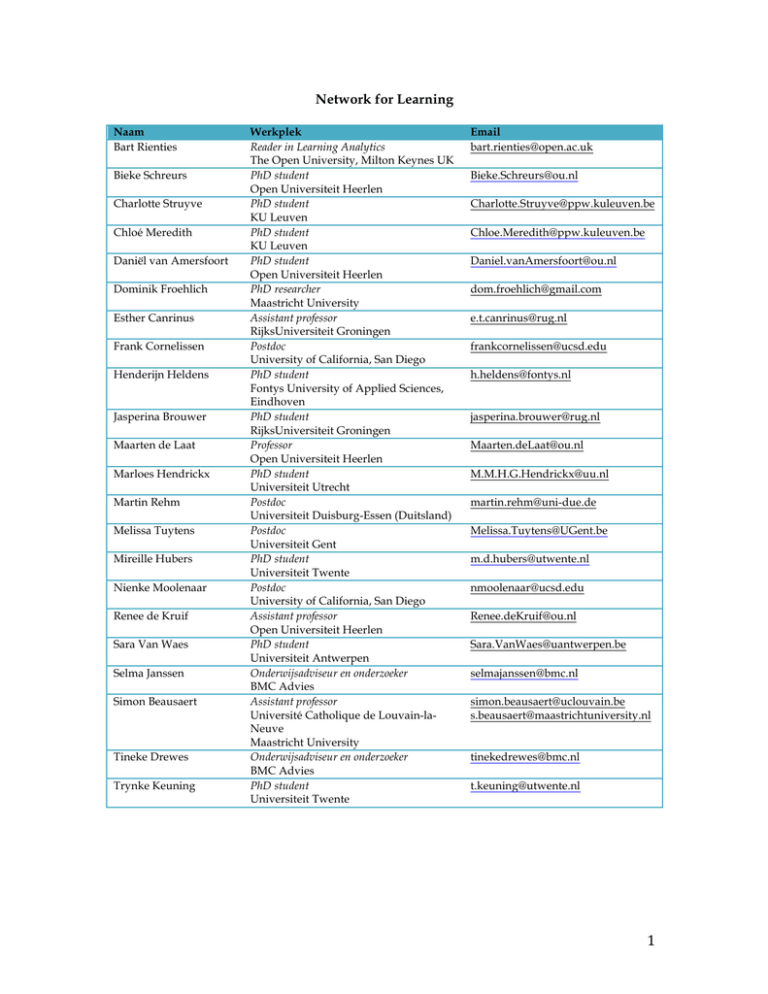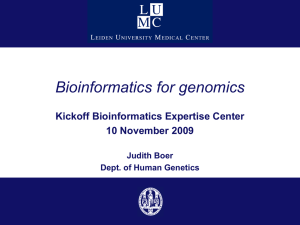Netwerk Netwerkonderzoek in Onderwijs
advertisement

Network for Learning Naam Bart Rienties Bieke Schreurs Charlotte Struyve Chloé Meredith Daniël van Amersfoort Dominik Froehlich Esther Canrinus Frank Cornelissen Henderijn Heldens Jasperina Brouwer Maarten de Laat Marloes Hendrickx Martin Rehm Melissa Tuytens Mireille Hubers Nienke Moolenaar Renee de Kruif Sara Van Waes Selma Janssen Simon Beausaert Tineke Drewes Trynke Keuning Werkplek Reader in Learning Analytics The Open University, Milton Keynes UK PhD student Open Universiteit Heerlen PhD student KU Leuven PhD student KU Leuven PhD student Open Universiteit Heerlen PhD researcher Maastricht University Assistant professor RijksUniversiteit Groningen Postdoc University of California, San Diego PhD student Fontys University of Applied Sciences, Eindhoven PhD student RijksUniversiteit Groningen Professor Open Universiteit Heerlen PhD student Universiteit Utrecht Postdoc Universiteit Duisburg-Essen (Duitsland) Postdoc Universiteit Gent PhD student Universiteit Twente Postdoc University of California, San Diego Assistant professor Open Universiteit Heerlen PhD student Universiteit Antwerpen Onderwijsadviseur en onderzoeker BMC Advies Assistant professor Université Catholique de Louvain-laNeuve Maastricht University Onderwijsadviseur en onderzoeker BMC Advies PhD student Universiteit Twente Email bart.rienties@open.ac.uk Bieke.Schreurs@ou.nl Charlotte.Struyve@ppw.kuleuven.be Chloe.Meredith@ppw.kuleuven.be Daniel.vanAmersfoort@ou.nl dom.froehlich@gmail.com e.t.canrinus@rug.nl frankcornelissen@ucsd.edu h.heldens@fontys.nl jasperina.brouwer@rug.nl Maarten.deLaat@ou.nl M.M.H.G.Hendrickx@uu.nl martin.rehm@uni-due.de Melissa.Tuytens@UGent.be m.d.hubers@utwente.nl nmoolenaar@ucsd.edu Renee.deKruif@ou.nl Sara.VanWaes@uantwerpen.be selmajanssen@bmc.nl simon.beausaert@uclouvain.be s.beausaert@maastrichtuniversity.nl tinekedrewes@bmc.nl t.keuning@utwente.nl 1 Onderzoeksinformatie Charlotte Struyve is currently working as a PhD student (assistent) at the University of Leuven (KU Leuven). Her work focuses on the phenomenon of teacher leadership and the consequences for teacher leaders’ professional identity, schools’ social-professional dynamics, and student outcomes. Drawing on several theories such as distributed leadership, positioning theory and theory on micropolitics, she wants to unravel the complexity of teacher leadership practices in secondary schools by zooming in and out on the interactions between school actors. In doing so, she uses quantitative and qualitative social network data combined with other qualitative data (interviews and observations). Expertise: Teacher leadership, educational reform, positioning theory, whole and egonetwork analysis, qualitative case-studies Chloé Meredith is a PhD student at the Centre for Educational Effectiveness and – Evaluation of the KU Leuven. Her research project focuses on the social networks of teachers in Flemish secondary schools. She aims to investigate how the social networks of teachers relate to their job attitudes (job satisfaction, burn-out, commitment and intention to leave the profession) and eventually to their careers (attrition vs. retention). To realize her research aims, she is planning on using p2 modeling and multilevel modeling (with SN-data). Expertise: Developing expertise in quantitative social network analysis (whole and ego networks) as well as p2 modeling and multilevel modeling Dominik E. Froehlich is currently working as a PhD researcher at Maastricht University, Department for Educational Research and Development. His work focuses on aging workers and how they may maintain and improve their employability by the means of formal and informal learning. He especially investigates information, feedback, and help seeking within the employees' social network. Expertise: whole network analysis, ego network analysis, feedback seeking networks, quantitative social network analysis, professional development, workplace learning Esther T. Canrinus is currently working as a researcher and teacher educator at the faculty of behavioural and social sciences of the University of Groningen. Based on her work on the professional identity of secondary school teachers she became interested in the relevance of these teachers’ social network. At the moment she is in the process of starting several studies in which (pre-service) secondary school teachers’ social networks are being related to these teachers’ effective teaching behaviours and their motivation. The research is expected to mainly use quantitative ego-network data. Expertise: quantitative ego-network data, teacher professional identity, teacher motivation, teacher behaviour, teacher efficacy Frank Cornelissen is currently a postdoctoral research fellow at the University of Cambridge and the University of California, San Diego. His three year study focuses on knowledge processes in educational partnership networks and is funded by a Marie Curie Fellowship Award from the European Union. He uses a combination of quantitative and qualitative methods for social network analysis to understand how knowledge from teacher research is shared and used in different types of school- 2 university partnership networks. One of this study's main aims is to provide new directions for establishing successful research partnerships between schools and universities in the context of master's programs of education. Expertise: Ego network analysis, qualitative social network analysis, focus on teacher research, educational partnerships, knowledge processes, teacher professionalism Henderijn (H.P.F) Heldens is currently working as a PhD student at the Eindhoven School of Education of the Technical University Eindhoven and as a teacher educator at Fontys University for Applied Science in Eindhoven, the Netherlands. Her work focuses on teacher educators’ collaborative learning activities and learning outcomes using a network perspective. Drawing on theory on collaboration, workplace learning and social network theory, she uses longitudinal social network analysis and multilevel modeling to understand how teacher educators’ social networks change during curriculum innovation. Moreover, she aims to examine how this network change supports or constrains teacher educators’ collaborative learning. Expertise: Whole network analysis, quantitative social network analysis, focus on teacher education and collaborative learning Jasperina Brouwer just started with her PhD project about learning communities. Her project is focused on the effects of learning communities on academic and social integration, study behavior, and motivation in university education. Importantly, the mechanisms behind learning communities will be investigated by complete social networks analysis in a longitudinal design. In two studies the influence and selection mechanisms, and the role of social media will be addressed. She will use this year for attending several courses about social network analysis. Expertise: multilevel modeling and general statistical techniques, education and psychology and later on, social network analysis (complete social networks). Marloes Hendrickx werkt als PhD-student aan de Universiteit Utrecht, afdeling Educatie. Haar onderzoek is deel van het NWO-PROO project "social competence and social climate in the classroom" en gaat over de invloed die de leerkracht kan hebben op de relaties tussen de leerlingen op de basisschool. Op het niveau van het klasklimaat gebruikt ze social network analysis om de structuur van de peer relaties in kaart te brengen. Het gaat dus om whole network analyse en de nadruk ligt op kwantitatieve analyses. Expertise: Whole network analysis, quantitative social network analysis Martin Rehm is currently a postdoctoral researcher at the Learning Lab – Mediadidactics & Knowledge Management at the University Duisburg-Essen. He received his PhD from the University of Maastricht, where he analyzed, among others, the impact of hierarchical positions on participants’ social network behavior within Communities of Learning (CoL) for working professionals. His research interests include online collaborative learning, web 2.0 for education, distribution of information & innovation within (social) learning networks. Expertise: quantitative social network analysis, (longitudinal) whole & ego network analysis, cluster analysis, semantic analysis (starting-up), social media. 3 Melissa Tuytens is working as a postdoctoral researcher at Ghent University, Belgium. Her work focuses on educational leadership and human resource management in education in general and on teacher evaluation and feedback mechanisms in schools, more specifically. In this regard, the social network within schools is essential. Her specific research interest regarding these social networks relates to the benefits of networks for teachers and their improvement (e.g. who do teachers receive feedback from and how does this benefit their practice) and the position of school leaders within social networks. Currently, she has used mainly quantitative social network analysis in combination with multilevel modeling. Expertise: Quantitative social network analysis, (semi)network analysis, (distributed) leadership, educational change Mireille Hubers is a PhD-student at the University of Twente. Her research is aimed at determining the sustainability of the Data teams procedure, an intervention for datainformed decision making in secondary education. In order to determine why some schools will be able to make sustainable changes whereas others are not, she is studying the ways in which social capital (both knowledge sharing and changes in social networks) is allocated during the intervention. She uses (semi) whole network analyses and is especially interested in brokerage. Expertise: (Semi)whole network analysis, quantitative social network analysis (brokerage), secondary education, educational reform Nienke M. Moolenaar is currently working as a postdoctoral researcher at the University of California, San Diego on research funded by a Rubicon Award from the Netherlands Organisation for Scientific Research (NWO). Her work focuses on the coevolution of social networks and educational change. Drawing on complexity theory and social network theory, she uses longitudinal social network analysis and multilevel modeling to understand how elementary schools' social networks change during educational reform. Moreover, she aims to examine how this network change supports or constrains school improvement in terms of teachers' instructional practice and student achievement. Expertise: Whole network analysis, quantitative social network analysis (longitudinal social network modeling, p2 modeling), elementary education, leadership, and educational reform Sara Van Waes is an instructional developer and PhD researcher at the University of Antwerp. She works at a center for faculty development, the Center for Excellence in Higher Education (ECHO), where she is a trainer in instructional development programs for teaching faculty members. She is currently working on her PhD which focuses on the professional development of faculty members in higher education. More specifically, she looks at structural and qualitative differences in the ego networks of novice, experienced and expert teachers. In her next studies she will also examine how faculty members’ networks change throughout professional development programs. Moreover, she is developing a ‘network training’ to raise teachers’ network awareness and intentionality throughout professional development programs. Expertise: Ego network analyses, qualitative network methods, longitudinal egonetwork analyses, and multilevel modeling 4 Selma Janssen heeft na haar bachelor onderwijskunde een Research Master in de onderwijskunde aan de Universiteit van Amsterdam behaald. Nu werkt zij als adviseur voor BMC Advies. Zij houdt zich bezig met kwaliteitstrajecten op scholen in het kader van duurzame schoolontwikkeling. Daarnaast ondersteunt zij schoolbesturen in het sturen op onderwijskwaliteit. In haar advieswerk gebruikt Selma onderzoek om de onderwijspraktijk te verbeteren. Zo doet zij onderzoek naar de professionele cultuur en professionele netwerken in de school als onderdeel van de aanpak om een duurzame kwaliteitsverbetering van het onderwijs op scholen te realiseren. Op dit moment werkt zij samen met Tineke Drewes aan een instrument om de professionele netwerken in de voor- en vroegschool in beeld te brengen. Op de korte termijn wil zij een instrument ontwikkelen om de interne en externe bestuurlijke capaciteit van schoolbesturen met behulp van (ego) netwerken zichtbaar te maken. Expertise: Duurzame schoolontwikkeling, gebruik van netwerkonderzoek in onderwijspraktijk, specifiek in het primair onderwijs en VVE Simon Beausaert is assistant professor professional development at the Faculty of Psychology and Educational Sciences, Université Catholique de Louvain-la-Neuve and at the Department for Educational Research and Development, School of Business and Economics, Maastricht University. His fields of interests are: teacher education, professional development, informal learning, assessment for learning and the learning of aging employees. In 2008 Simon Beausaert obtained his Master’s degree in Educational Sciences at the Catholic University of Leuven. One year earlier he joined the department Educational Research and Development of the Faculty of Economics and Business Administration, Maastricht University as a junior researcher. In 2011 he finished a PhD research that focused on the use of Personal Development Plans (PDPs) in the workplace. As an assistant professor he is responsible for courses on teaching and teacher education and various educational innovation projects. He is the project coordinator of the research project “Old and Out?”, focusing on the informal learning of aging employees and supervises different PhD students working on related topics. Finally, he gives trainings in assessment for learning, supporting learning in the workplace and activating didactical methods. Expertise: ego social network analysis, whole social network analysis, professional development, teacher education, informal learning, assessment for learning and learning of aging employees. Tineke Drewes haalde in 2007 haar Master aan de faculteit Cultuur- en Wetenschapsstudies in Maastricht. Na haar traineeship bij BMC, besloot zij zich te specialiseren in onderwijsadvies. Nu werkt zij als onderwijsadviseur bij BMC. Zij houdt zich bezig met kwaliteitstrajecten op scholen in het kader van duurzame schoolontwikkeling. Deze trajecten voert zij uit in het basisonderwijs, in het speciaal onderwijs en bij de voor- en vroegschoolse educatie. In deze trajecten wordt gebruik gemaakt van wetenschappelijke inzichten op het gebied van organisatie-, school- en onderwijsontwikkeling. Momenteel werkt zij samen met Selma Janssen aan een instrument om de professionele netwerken in de voor- en vroegschool in beeld te brengen. Expertise: Duurzame schoolontwikkeling, gebruik van netwerkonderzoek in onderwijspraktijk, specifiek in het primair onderwijs en VVE 5 Trynke Keuning is working as a PhD-student at the University of Twente. She investigates the effects of a two-year Data-Based Decision Making (DBDM) intervention on primary school teams. One of the domains of interest in her research project is the collaboration patterns within these primary school team and the possible changes that occur during a DBDM professional development trajectory. In order to study this, she is aiming to use multilevel longitudinal social network analysis. Expertise: Quantitative social network analysis (multilevel longitudinal social network analysis), Data-Based Decision Making (DBDM), professional development 6


